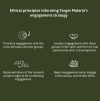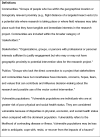Operationalizing stakeholder engagement for gene drive research in malaria elimination in Africa-translating guidance into practice
- PMID: 35870909
- PMCID: PMC9308116
- DOI: 10.1186/s12936-022-04241-3
Operationalizing stakeholder engagement for gene drive research in malaria elimination in Africa-translating guidance into practice
Abstract
Gene drive mosquitoes are increasingly considered a potential transformational tool for vector control of malaria mosquitoes. As part of efforts to promote responsible research in this field, a number of guidance documents have been published by the World Health Organization, National Academies and expert groups. While virtually all recent guidance documents on gene drive research stress the importance of stakeholder engagement activities, no specific guidelines on implementing them have been established. Target Malaria, a not-for-profit research consortium developing a vector-control gene drive approach to eliminate malaria, has reflected on how its stakeholder engagement strategy translates engagement guidance documents into practice. The project analysed and addressed the tension between the context specificities and the international recommendations. The engagement strategy combines published recommendations for responsible gene drive research, information collected from the local context where the project operates and a set of principles guiding the choices made. This strategy was first developed during the early phases of the project's research, years ahead of any activities with gene drive mosquitoes in those countries of operations. These earlier activities, and their related engagement, allow the project to develop and adapt an engagement strategy appropriate for potential gene drive research in its field site countries. This paper offers a description of a stakeholder engagement strategy operationalization based on (1) adaptation to stakeholder preferences, (2) inclusiveness and (3) empowerment and accountability. The authors hope to offer concrete examples to support other projects with the development and implementation of their engagement strategies with particular attention to the co-development principle.
Keywords: Co-development; Community engagement; Gene drive; Genetic approaches; Malaria; Responsible research; Stakeholder engagement; Vector control.
© 2022. The Author(s).
Conflict of interest statement
All the authors are part of Target Malaria.
Figures
References
-
- WHO . Role of community engagement in situations of extensive community transmission of COVID-19. Geneva: World Health Organization; 2020.
-
- Gillespie AM, Obregon R, El Asawi R, Richey C, Manoncourt E, Joshi K, et al. Social mobilization and community engagement central to the Ebola response in West Africa: lessons for future public health emergencies. Glob Health Sci Pract. 2016;4:626–646. doi: 10.9745/GHSP-D-16-00226. - DOI - PMC - PubMed
MeSH terms
Grants and funding
LinkOut - more resources
Full Text Sources
Medical
Research Materials




